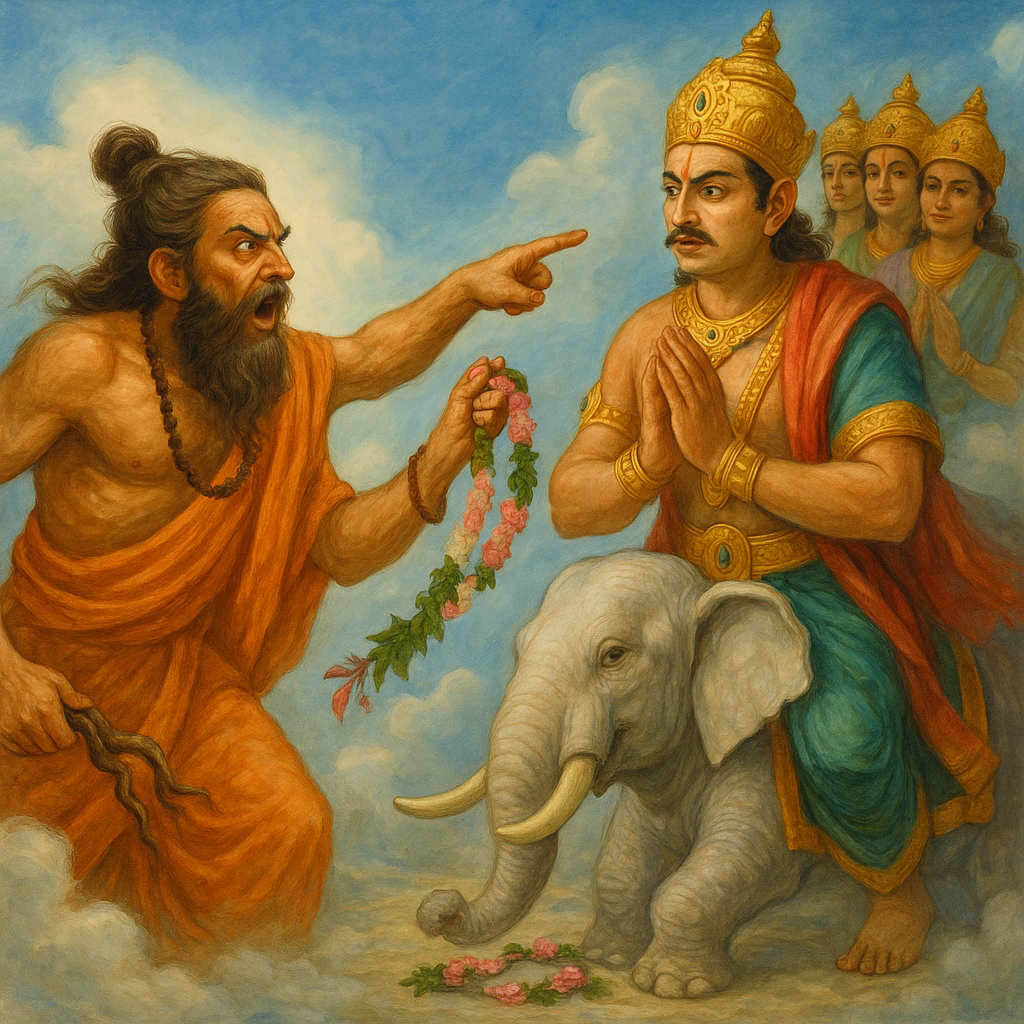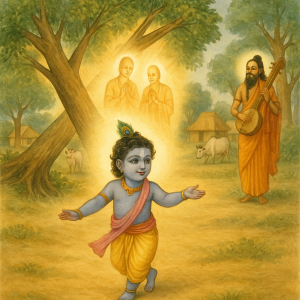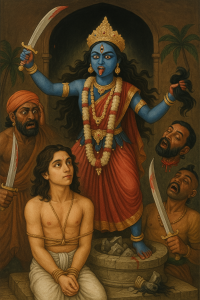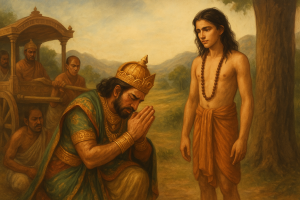The Story of Indra and Durvāsā Muni
As told in the Śrīmad-Bhāgavatam (Canto 8, Chapters 5–7)
The Sage and the Garland
Once, Durvāsā Muni, the great mystic sage known for his quick temper and deep devotion to Lord Śiva and Lord Viṣṇu, was traveling the three worlds. His heart was filled with devotion, and he carried with him a most precious offering—a divine garland gifted by the goddess Sarasvatī, infused with the blessings of prosperity and spiritual potency.
As he moved through the heavens, he encountered Indra, the king of the demigods, riding gloriously on his elephant Airāvata, surrounded by celestial attendants. The sage, with great affection and spiritual intent, offered the garland to Indra as a symbol of auspiciousness and divine grace.
Indra’s Arrogance and Disrespect
But Indra, proud of his wealth and power, did not understand the garland’s significance. Carelessly, he took it and placed it on the trunk of Airāvata, who in turn threw it to the ground and trampled it underfoot.
Durvāsā Muni was shocked and deeply insulted. The garland, an embodiment of Śrī (the goddess of fortune), had been dishonored. The sage’s heart burned with grief—not because of personal pride, but because a divine gift from the Lord had been treated as meaningless.
With fiery eyes and trembling voice, Durvāsā Muni cursed Indra:
“Because of your arrogance, disrespect, and inability to recognize saintly blessings, you shall lose all your opulence, power, and position. You and your devas will be stripped of your strength and glory!”
And with that, the sage departed.
Heaven Falls into Chaos
As the curse took effect, the devas found themselves weakened and vulnerable. Their enemies—the asuras (demons)—sensed their downfall and attacked with renewed force. The balance of the cosmos shifted. Rain stopped. Crops failed. Sacrifices bore no fruit. Heaven, once the seat of joy, became a place of fear.
Indra, realizing his grave mistake, approached Lord Brahmā for help. Brahmā, in turn, led the devas to the shelter of Lord Viṣṇu, who explained that their suffering was the result of Indra’s Vaiṣṇava aparādha—an offense against a great devotee.
The Road to Recovery: Churning the Ocean
To reverse the curse, Lord Viṣṇu advised cooperation with the demons to churn the ocean of milk (Kṣīra-sāgara) and produce amṛta (nectar of immortality). The devas, humbled, agreed. With Mount Mandara as the churning rod and Vāsuki the serpent as the rope, they began the monumental task.
It was only after immense effort, loss, and humility that the nectar emerged—along with Dhanvantari, Lakṣmī-devī, and ultimately, the restoration of the devas’ strength.
🌿 Lessons to Be Learned
1. Never Disrespect a Devotee or Their Gift
Even if we do not understand the value of something, if it is offered with devotion, it should be honored with reverence. What seems ordinary to us may be divine in origin.
2. Pride Blocks Spiritual Vision
Indra’s downfall began not with sin, but with arrogance. Pride made him blind to the significance of Durvāsā Muni’s offering.
3. Vaiṣṇava Aparādha Has Cosmic Consequences
Disrespecting a devotee doesn’t just affect personal spiritual life—it disturbs the harmony of the universe. Devotees are deeply connected to the Lord, and offending them brings disruption to the entire order.
4. Only Humility Can Heal
The devas could not reclaim their power through force, weapons, or cunning. Only when they humbled themselves before Lord Viṣṇu and acted with cooperation and service, was the curse lifted.



